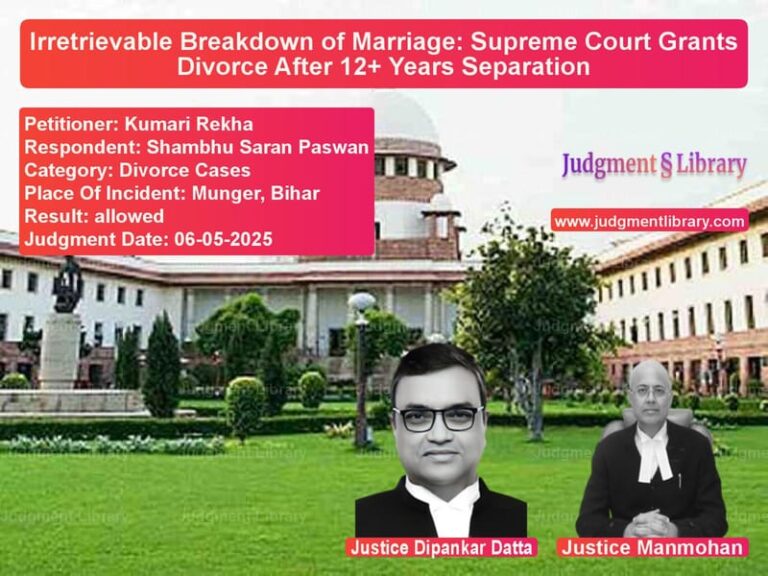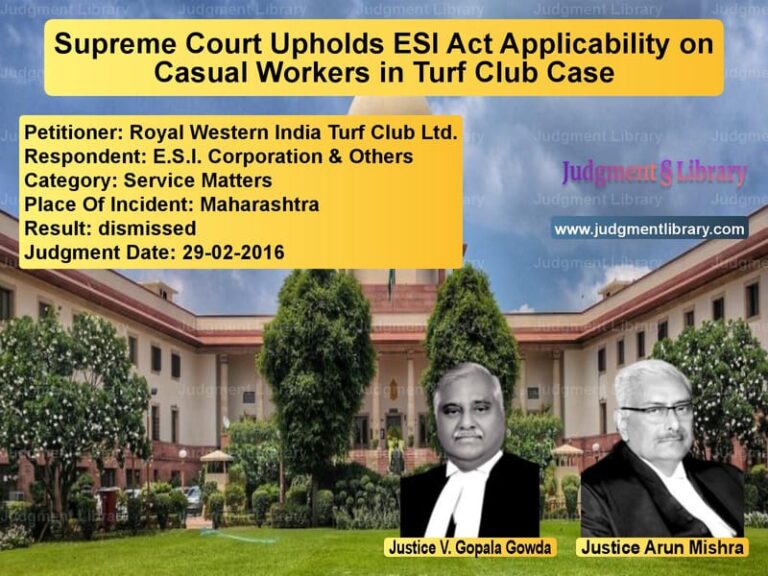Sanction for Prosecution of Public Servants: Supreme Court’s Ruling on Delays and Independent Decision-Making
The Supreme Court of India, in the case of Vijay Rajmohan v. State Represented by the Inspector of Police, CBI, ACB, Chennai, Tamil Nadu, addressed two significant legal questions regarding the sanction for prosecution of public servants under the Prevention of Corruption Act, 1988 (PC Act). The first issue was whether an order of the Appointing Authority granting sanction for prosecution would be rendered illegal if it relied upon advice from the Central Vigilance Commission (CVC). The second issue pertained to whether the period of three months (extendable by one more month for legal consultation) for granting sanction was mandatory, and if criminal proceedings could be quashed if the sanction was delayed beyond this period.
The case stemmed from allegations that the appellant, a government official, had acquired assets disproportionate to his known sources of income. An investigation by the Central Bureau of Investigation (CBI) led to a request for sanction from the Department of Personnel and Training (DoPT) to prosecute the appellant. However, the sanction process was significantly delayed, raising concerns about the application of independent judgment and the consequences of delay.
Background of the Case
The appellant was accused of accumulating disproportionate assets amounting to Rs. 79,17,593/- between 2005 and 2012. The CBI registered an FIR against the appellant and his family members under Section 109 of the Indian Penal Code (IPC) and Sections 13(1)(e) and 13(2) of the PC Act. The prosecution required prior sanction from the DoPT, which took nearly two years to grant it. The delay and alleged reliance on CVC’s advice formed the basis of the legal challenge.
Petitioner’s Arguments
The appellant challenged the sanction on two main grounds:
- The DoPT acted under the influence of the CVC rather than exercising independent judgment, making the sanction order invalid.
- The delay of nearly two years in granting sanction violated the requirement of a three-month period as prescribed by law, warranting the quashing of proceedings.
To support these arguments, the appellant relied on precedents such as Mansukhlal Vithaldas Chauhan v. State of Gujarat, which emphasized that the sanctioning authority must apply its own mind and not act under dictation.
Respondent’s Arguments
The State, represented by the Additional Solicitor General, contended that:
- The DoPT had indeed exercised independent judgment and merely sought clarifications from the CVC as part of due diligence.
- The period prescribed for granting sanction was directory and not mandatory, meaning that delay did not automatically render the sanction invalid.
- The appellant had not raised the issue of delay before lower courts, and thus, it should not be entertained at this stage.
Observations of the Supreme Court
The Supreme Court examined the legal framework surrounding the sanction for prosecution of public servants. It noted that:
- The PC Act, the Criminal Procedure Code (CrPC), the Central Vigilance Commission Act (CVC Act), and the Delhi Special Police Establishment Act form an integrated scheme for dealing with corruption cases.
- Section 8 of the CVC Act empowers the CVC to provide advice on matters of corruption but does not allow it to dictate decisions.
- While the DoPT could seek advice from the CVC, the final decision must be its own, applying an independent mind.
The court distinguished this case from Mansukhlal Vithaldas Chauhan, stating that the legal landscape had evolved since that judgment, and the CVC now had a statutory role in assisting sanctioning authorities.
Ruling on Independent Decision-Making
The Supreme Court concluded that the DoPT had not blindly followed the CVC’s recommendation but had sought clarifications and made its own assessment before granting sanction. Thus, the sanction was valid, and the appellant’s argument of acting under dictation was rejected.
Ruling on Delay in Granting Sanction
Regarding the delay in granting sanction, the Supreme Court emphasized that:
- The statutory period of three months (extendable by one more month) for granting sanction was mandatory.
- Failure to comply with this timeframe did not automatically result in the quashing of proceedings.
- Instead, the sanctioning authority should be held accountable for undue delays.
The court referred to its decisions in Vineet Narain v. Union of India and Subramanian Swamy v. Manmohan Singh, which stressed the need for timely action on sanction requests. However, it rejected the appellant’s argument that delays should lead to the quashing of prosecution, as this would undermine the fight against corruption.
Final Verdict
The Supreme Court dismissed the appeal, affirming that:
- The DoPT had exercised independent judgment and was not acting under dictation.
- While the delay in granting sanction was concerning, it did not justify quashing the prosecution.
- Aggrieved parties could seek accountability measures, including judicial review, to address delays in sanctioning decisions.
The judgment reinforces the importance of timely decision-making in corruption cases while ensuring that sanctioning authorities exercise their judgment independently. It also underscores the necessity of holding authorities accountable for delays without allowing procedural lapses to derail anti-corruption efforts.
Read also: https://judgmentlibrary.com/appeal-allowed-in-murder-conviction-case-key-court-insights/
Petitioner Name: Vijay Rajmohan.Respondent Name: State Represented by the Inspector of Police, CBI, ACB, Chennai, Tamil Nadu.Judgment By: Justice B.R. Gavai, Justice Pamidighantam Sri Narasimha.Place Of Incident: Tamil Nadu.Judgment Date: 11-10-2022.
Don’t miss out on the full details! Download the complete judgment in PDF format below and gain valuable insights instantly!
Download Judgment: vijay-rajmohan-vs-state-represented-by-supreme-court-of-india-judgment-dated-11-10-2022.pdf
Directly Download Judgment: Directly download this Judgment
See all petitions in Bail and Anticipatory Bail
See all petitions in Fraud and Forgery
See all petitions in Money Laundering Cases
See all petitions in Judgment by B R Gavai
See all petitions in Judgment by P.S. Narasimha
See all petitions in dismissed
See all petitions in supreme court of India judgments October 2022
See all petitions in 2022 judgments
See all posts in Criminal Cases Category
See all allowed petitions in Criminal Cases Category
See all Dismissed petitions in Criminal Cases Category
See all partially allowed petitions in Criminal Cases Category







